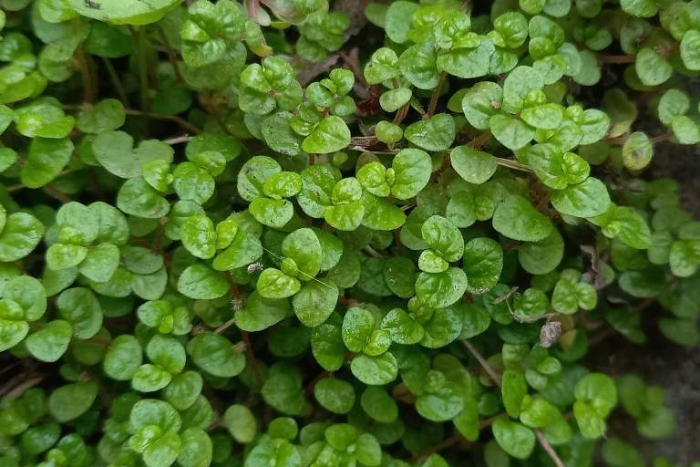Baby’s Tears
(Soleirolia soleirolii)
Baby’s Tears (Soleirolia soleirolii)
/
/

Josep Gesti
CC BY-SA 4.0
Image By:
Josep Gesti
Recorded By:
Copyright:
CC BY-SA 4.0
Copyright Notice:
Photo by: Josep Gesti | License Type: CC BY-SA 4.0 | License URL: http://creativecommons.org/licenses/by-sa/4.0/ | Rights Holder: Josep Gesti | Publisher: iNaturalist | Date Created: 2021-06-13T09:47:26-07:00 |




















































Estimated Native Range
Summary
Soleirolia soleirolii, commonly known as Baby’s Tears or Corsican Creeper, is an evergreen perennial herb native to the Mediterranean region, specifically the islands of Corsica and Sardinia, and parts of the Italian mainland. It thrives in moist, shaded environments such as the understory of forests, often near streams or in other damp locations. This plant typically forms dense, lush mats of foliage close to the ground, reaching up to 4 inches (10 cm) in height. Its leaves are small, round, and bright green, creating a soft, carpet-like appearance. Baby’s Tears bloom in spring and summer, producing multitudes of inconspicuous white flowers that are less noticeable compared to the foliage.
Baby’s Tears is valued for its ability to cover the ground quickly, making it an excellent choice for terrariums, as a ground cover in shaded gardens, or grown indoors as a houseplant. It is also popular in vivarium setups for amphibians due to its preference for high humidity and moderate moisture. While it can tolerate low light, it thrives in bright, indirect sunlight. The plant requires consistently moist soil but does not do well in standing water, except when grown submerged in swampy or boggy conditions. It is relatively low-maintenance but can spread aggressively if conditions are ideal. In some areas, it is considered invasive due to its ability to reproduce vegetatively; any fragments left in the soil can potentially regrow.CC BY-SA 4.0
Baby’s Tears is valued for its ability to cover the ground quickly, making it an excellent choice for terrariums, as a ground cover in shaded gardens, or grown indoors as a houseplant. It is also popular in vivarium setups for amphibians due to its preference for high humidity and moderate moisture. While it can tolerate low light, it thrives in bright, indirect sunlight. The plant requires consistently moist soil but does not do well in standing water, except when grown submerged in swampy or boggy conditions. It is relatively low-maintenance but can spread aggressively if conditions are ideal. In some areas, it is considered invasive due to its ability to reproduce vegetatively; any fragments left in the soil can potentially regrow.CC BY-SA 4.0
Plant Description
- Plant Type: Herb
- Height: 0.3-0.5 feet
- Width: 3-6 feet
- Growth Rate: Rapid
- Flower Color: N/A
- Flowering Season: Spring, Summer
- Leaf Retention: Evergreen
Growth Requirements
- Sun: Part Shade, Full Shade
- Water: Medium
- Drainage: Medium
Common Uses
Bank Stabilization, Drought Tolerant, Groundcover, Low Maintenance, Potted Plant
Natural Habitat
Native to the Mediterranean region, specifically the islands of Corsica and Sardinia, and parts of the Italian mainland
Other Names
Common Names: Mother Of Thousands , Angel’s Tears , Peace In The Home , Bits And Pieces , Bread And Cheese , Friendship Plant , Mind-Your-Own-Business , Corsican Carpet , Corsican-Curse , Irish-Moss
Scientific Names: Soleirolia soleirolii , Helxine soleirolii , Parietaria soleirolii , Parietaria repens , Parietaria cretica , Soleirolia corsica , Soleirolia repens
GBIF Accepted Name: Soleirolia soleirolii (Req.) Dandy